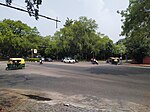India Habitat Centre
1993 establishments in DelhiBuildings and structures in DelhiConvention centres in IndiaCultural centres in IndiaCultural infrastructure completed in 1993 ... and 3 more
Culture of DelhiEvent venues established in 1993Use Indian English from August 2016

The India Habitat Centre is a multipurpose building in the city of New Delhi, India. The India Habitat Centre is one of India’s most comprehensive convention centers that is aimed at bringing individuals and institutions working in diverse habitat and environment related areas together. Divided into five blocks which are connected with aerial walkaways, IHC can conduct up to 20 concurrent sessions from socio-cultural events and exhibitions to business and economic events. It has a Visual Art Gallery, Library and Resource Center, Learning Center, Amphitheater, Conference & Banquet Halls and Restaurants.
Excerpt from the Wikipedia article India Habitat Centre (License: CC BY-SA 3.0, Authors, Images).India Habitat Centre
Lodhi Road,
Geographical coordinates (GPS) Address Phone number Website Nearby Places Show on map
Geographical coordinates (GPS)
| Latitude | Longitude |
|---|---|
| N 28.589695 ° | E 77.224906 ° |
Address
India Habitat Centre
Lodhi Road
110003
Delhi, India
Open on Google Maps





